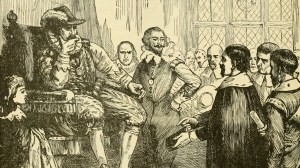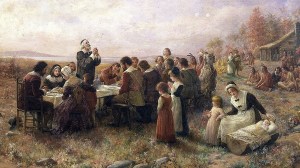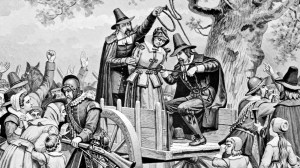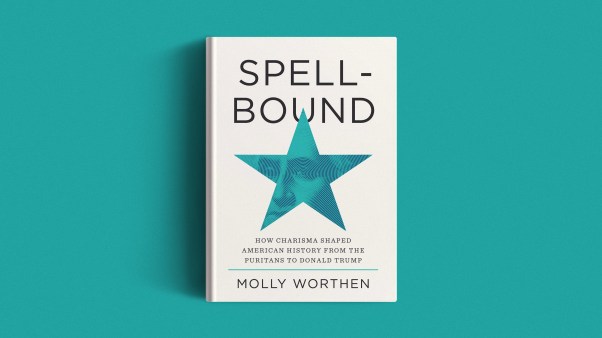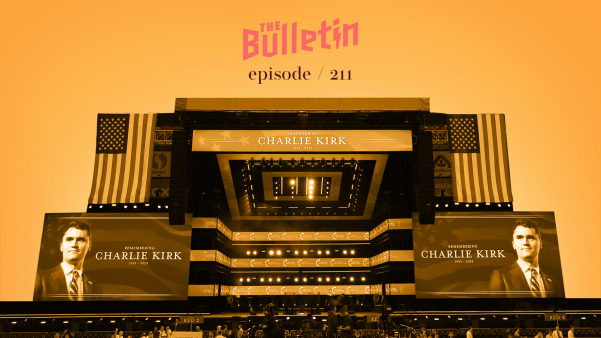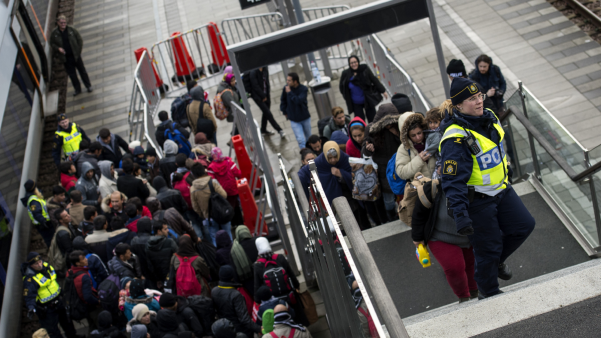In this series

The Puritans
1569-1619
1569 Thomas Cartwright argues for a purified English Christianity
1571 Parliament approves Thirty-Nine Articles of Religion
1590 Thomas Cartwright and others arrested for trying to reform the church
1593 Execution of two separatists
1603 James VI of Scotland becomes James I of England
1604 King James I thwarts most Puritan reforms in their “Millenary Petition”
1608 Puritan separatists from town of Scrooby migrate to Netherlands to avoid persecution
1620-1639
1620 Scrooby separatists return to England and then sail for Virginia on the Mayflower; these Pilgrims settle outside Virginia’s boundaries
1629 Increasing pressure put on Puritans in England. New England Company reorganized as Massachusetts Bay Company
1630 The Arbella and sister ships sail for Massachusetts; Governor John Winthrop makes Boston seat of colony
1633 William Laud becomes Archbishop of Canterbury, fueling Great Migration of Puritans to New England
1635 Roger Williams banished from Bay Colony, founds Providence the following year
1636 Harvard College founded. Puritans from Massachusetts found Hartford, Connecticut
1637 Native Americans and Puritans battle in Pequot War. New Haven colony founded
1638 Anne Hutchinson banished
1640-1659
1640Bay Psalm Book published
1642 English Civil War begins; American Puritans side with Parliament against King Charles I
1643 Parliament establishes Westminster Assembly to reform the English church
1644 Rhode Island granted charter
1649 Cambridge Platform defines New England congregationalism; King Charles I beheaded; Commonwealth of England proclaimed; reforming forces reign
1650 Anne Bradstreet’s poetry published in England
1651 John Eliot founds village for praying Indians
1653 Puritan Oliver Cromwell becomes Lord Protector of England
1656 First Quakers in Massachusetts arrested and banished
1658 Oliver Cromwell’s death opens struggle for English supremacy
1660-1679
1660 American Puritan hopes for reform permanently dashed when Catholic Charles II crowned king of England; persecution of English Puritans resumed; many emigrate or return to New England
1661 Executions of Quakers in Massachusetts halted by Charles II
1662 Connecticut absorbs New Haven Colony.Day of Doom, a best-selling verse jeremiad, calls for repentance. Half-Way Covenant eases requirements for church membership
1675 Wampanoags and Puritans battle in King Philip’s War
1677 Massachusetts incorporates Maine into its jurisdiction
1679 Reforming Synod calls for spiritual renewal and supports congregationalism
1680-1699
1684 Complaints against Bay magistrates lead to revoking of Massachusetts Charter; two years later, royal governor appointed for Dominion of New England (Massachusetts, Maine, New Hampshire, Plymouth, and Rhode Island)
1687 Solomon Stoddard advocates open Communion, liberalizing requirements to take Communion
1688 Glorious Revolution: Protestant William of Orange invades England, and Catholic James II flees
1689 Boston rebellion topples the Dominion government; Act of Toleration in England eases pressure on non-conforming Protestants
1691 William and Mary grant Massachusetts new charter, partly restoring popular basis of government
1692 Witchcraft trials at Salem Village
1699 “Brattle Street Manifesto” by a new congregation greatly eases membership requirements and marks appearance of liberal faction
1700-1734
1700 Harvard liberals force out Increase Mather as college president
1701 Yale University founded by orthodox Connecticut clergy
1702 Cotton Mather publishes Magnalia Christi Americana, a history of early New England
1708 Connecticut clergy adopt Saybrook Platform, modifying pure congregationalism
1721 Smallpox epidemic in Boston Cotton Mather advocates inoculation
1734 Jonathan Edwards’ preaching stimulates revival at Northhampton and beginning of Great Awakening
Other Events
1569-1619
1588 Spanish Armada defeated, giving England control of seas
1589 Forks first used in French court
1610 Henry Hudson reaches Hudson Bay
1611 King James Version published
1616 William Shakespeare dies
1620-1639
1632 Maryland colony, a haven for Catholics, chartered by Charles I
1633 Galileo forced to recant
1634 French explorer Jean Nicolet sees Lake Michigan and thinks he has reached Asia; Oberammergau Passion Play given for first time.
1640-1659
1644 Ming dynasty in China ends
1646 George Fox begins ministry; start of Quaker movement
1650 Tea first drunk in England
1651 Thomas Hobbes’s The Leviathan
1654 Blaise Pascal converted
1660-1679
1664 British take New Netherlands and call it New York
1665 Great Plague of London kills nearly 70,000
1667 John Milton’s Paradise Lost
1675 Spener’s Pia Desideria signals emergence of Pietism
1678 John Bunyan’s Pilgrim’s Progress
1680-1699
1682 Peter the Great czar of Russia
1685 George Frederick Handel born
1687 Isaac Newton’s Principia
1690 John Locke’s Two Treatises on Civil Government
1700-1734
1707 Isaac Watts’s Hymns and Spiritual Songs
1718 In Texas, San Antonio Mission (the Alamo) is founded
1721 J. S. Bach writes Brandenburg Concertos
1723 Benjamin Franklin becomes printer in Philadelphia
Dr. Francis J. Bremer is professor of history at Millersville (Pennsylvania) University. He is author of The Puritan Experiment: New England Society from Bradford to Edwards (St. Martin’s, 1976).
Copyright © 1994 by the author or Christianity Today/Christian History magazine.Click here for reprint information on Christian History.


